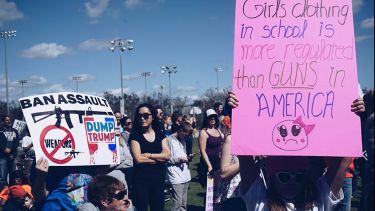Mass shootings and support for gun control
People living near a mass shooting in the United States of America are more likely to support stricter gun controls, according to research by the Sheffield Method Institute's Dr Todd Hartman.

Dr Hartman with co-author Dr Benjamin J Newman from the University of California, Riverside, merged data from more than 200 mass public shootings (defined as three or more people injured or killed) between 1966 to 2010 with survey data on the gun control preferences of more than 50,000 people using the 2010 Cooperative Congressional Election Study (CCES).
The CCES study includes measures of respondents’ preferences toward government regulation of firearms and geolocation information (zip codes) for all those who took part. Researchers were then able to measure the distance in miles between a respondent and the exact location of the nearest mass shooting.
To separate out the effect of distance, researchers took into account the number of murders per capita, the number of firearms per person, the Republican vote in a respondent’s county of residence and a range of other control variables.
The study found that regardless of these variables an increase in proximity to a shooting was associated with a significant increase in support for stricter gun control laws.
Those living in an area where a mass shooting occurred had a 20 per cent increase in the probability of supporting stricter gun control compared to those living furthest away.
Dr Todd Hartman, Lecturer in Quantitative Methods at the University of Sheffield’s Methods Institute and co-author of the study, said: “Surprisingly, there has been little research investigating whether mass shootings affect individual opinion toward gun control policy.
Our research suggests that there is a clear demand for stricter gun control for those most at risk of random acts of extreme gun violence
Dr Todd Hartman
Sheffield Methods Institute
“Our study suggests a clear link between those that live in an area where a mass shooting has taken place and a desire for stricter gun regulation.”
In much of the Western world, mass shootings have been swiftly followed by legislation to tighten controls around firearms. In the UK, the 1996 Dunblane school shooting of 16 British school children and a teacher led to the two firearms acts and a permanent ban on private handgun ownership.
Similarly, Australia outlawed automatic and semi-automatic weapons, as well as pump-action shotguns, in the aftermath of the 1996 Port Arthur Massacre in Tasmania which left 35 dead and 23 wounded. However, despite the US regularly seeing similar tragedies these have not led to any significant changes in gun policy.
“The US is unusual compared to other Western nations in that despite its high number of mass shootings, we have not seen a major change in firearm legislation like we have in the UK and Australia.
“Our research suggests that there is a clear demand for stricter gun control for those most at risk of random acts of extreme gun violence,” Dr Hartman said.
The study also found that variables related to local gun culture had the most powerful effects on attitudes toward firearms.
Areas with a high number of firearm stores were associated with significant decreases in support for gun control, while densely populated areas, with well-educated, politically liberal and racially diverse residents, were associated with an increased support for tighter restrictions on firearms.
Dr Hartman added: “Our findings place gun violence and gun control on par with policy-feedback loops similar to other issues such as environmental regulation, disaster preparedness, and regulation of speculative financial trading, where the breaking of opinion inertia and status quo policy requires significant shocks that inflict pain on the nation.”
